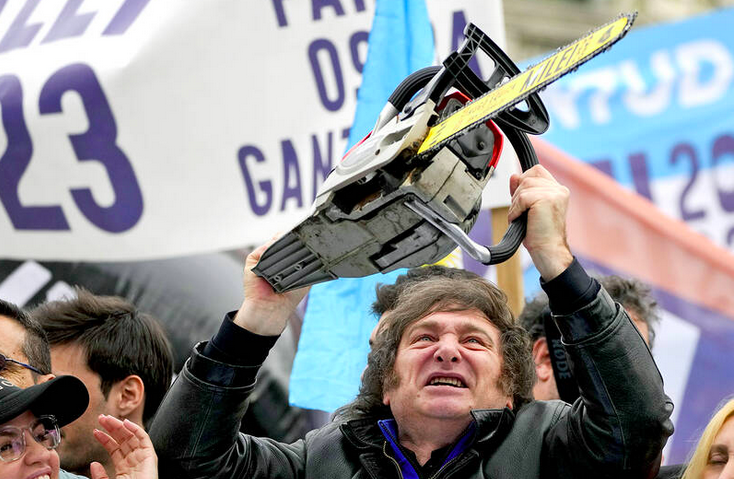Argentina has elected Javier Milei as its new President, who will take charge from December 12 on. Milei was the candidate of the Liberty Advances (LLA – for its initials in Spanish), a prty founded just 2 years ago. He was elected in the second round of elections by getting 55.7% of the votes against current minister of economy, Sergio Massa, who obtained 44.3% of the votes.
Javier Milei presented himself as an anti-systemic candidate, who announces profound changes in the country’s economic and foreign policy.
In his speech given after his declaration of electoral victory, Milei announced the “reconstruction of Argentina”.
But his economic program indicates more a de-construction of the state. The – now oppositional – newspaper Pagina12 summarizes his economic policy with the following points:
- Elimination of price controls;
- Elimination of foreign currency transaction controls;
- Full freedom of foreign trade;
- Elimination of export controls and taxes on exports;
- Liberalization of imports;
- Elimination of social and political tariffs in public services;
- Elimination of subsidies;
- Limitation of public budget deficit;
- Limitation of public spending, start of a privatization program for state-owned enterprises.
Himself an economist, Milei stated “the situation of Argentina is dramatic, and the country needs drastic changes. There is no room for step-by-step policies, for mediocre actions. If we don’t proceed fast, we will face the worst crisis in our history”.
Inflation is at 143%, net reserves of foreign currency are deep in the red, savers are ditching the peso, and a recession is looming – if not already here. Four in 10 Argentines live in poverty and a sharp peso devaluation is likely.
Milei’s plan includes in that context also dolarization of the economy. His expected Foreign minister, Diana Mondino, also economist, stated in an interview that society was already interacting based on US dollars, but with legal limits to conduct investment and trade. She described dolarization as the elimination of all obstacles against Dollar-based domestic economic interaction.
Javier Milei already announced the closure of the Central Bank. But the new president does not intend to stop there. In a video he published in August, he had announced the closure of 11 different ministries, including those for social security, education, environment, culture, for public works, science and technology and transport.
The president-elect said that not only the ministries but also their bureaucratic apparatus would be abolished.
US investors for the time being reacted enthusiastically, with Argentine Bonds traded in New York gaining 40% value after Milei’s victory.
And Washington probably is also delighted, as Milei during his campaign had announced strengthening Argentina’s alliance with the US while placing, to say the least, distance to emerging global powers such as Russia and China.
Milei stated he will pursue a visit to the US and Israel – even before taking office. To his presidential ceremony, he invited Brazil’s former president Jair Bolsonaro, a staunch ally of Trump who currently is being charged with pursuing a coup d’etat.
Meanwhile Brazilian Social Communications Minister Pimenta said Milei first had to apologize to Lula for offensive comments, before bilateral talks could begin.
And as for Argentina’s BRICS membership, due to begin on January 1st, 2024, designated foreign minister Mondino stated ‘We do not understand the interest n the bloc’.
Milei also had promised “not to negotiate with communists” – in respect to Brazilian leader Lula, whom he called “an angry communist” as well as the People’s Republic of China.
But experts argue that given Argentina’s need for foreign finance, and the importance of Swap agreements with China in it, the president-elect will soon have to abide economic reality.
In that context, it is worth remembering that former Brazilian President Bolsonaro, a decided anti-communist as well, had to bow maintaining economic relations with China despite his ideological position.
Still, Bolsonaro’s path might be indicating the road ahead of Milei: Despite continuing bilateral relations, the Brazilian had practically withdrawn his country from BRICS, slowing down the organizations progress seriously. Milei might opt for a similar option.
Still, an open question are also relations between Buenos Aires and Washington. Sharing Donald Trump’s ideology on climate change, government regulation, the Argentine president-elect faces today still a Democratic Administration in Washington – which will welcome his statement of fully aligning with the US and Israel, but might interfere on domestic policies.
And here, given Milei’s program of essentially dismantling the nation-state – another similarity to Trump, it needs to be seen whether he can overcome domestic resistance. Argentina has surely strong experience with neoliberal dictatorships. But it also has a great experience in resisting them.
Cover photo: Javier Milei with a chain saw during his campaign, a symbol to cut down the state apparatus and interference. Photo: AP.
















Leave a Reply